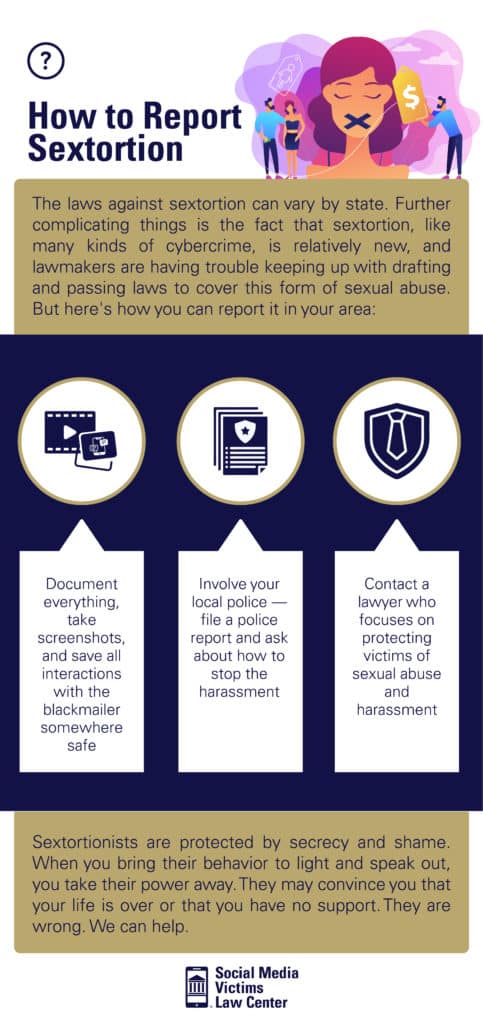Social Media and Sextortion
Sextortion is a form of online sexual abuse where a victim is threatened to send explicit photos or videos to the blackmailer, or a blackmailer threatens to expose a victim’s intimate or sexual content unless the victim complies with the blackmailer’s demands. It is wrong. It is sexual abuse, and as a victim, you deserve protection.

- Content last updated on:
- September 18, 2025
Written and edited by our team of expert legal content writers and reviewed and approved by

- Content last updated on:
- September 18, 2025
Social media has changed the way we interact with one another, including how we approach and navigate intimacy and relationships.
Unfortunately, not everyone who uses social media in this context has the best intention. You may have heard about sexual blackmailing, also known as sextortion, and wonder how you can protect yourself or your children.
Sextortion is a relatively new term, as is the action itself, and many people have questions about how social media plays a role in sextortion and their rights under the law. Social Media Victims Law Center has the answers.
What is sextortion?
Sextortion is a combination of two words: sexual extortion. By definition, extortion is the practice of obtaining something through force or threats.
Sextortion happens when someone uses coercion or threats to make the victim provide sexually explicit images, sexual favors, or money. The sextortionist may use flattery, gifts, money, lies, impersonation, and other methods to make the victim comply.
Sextortion is a serious crime and can take different forms, including revenge porn, cyber blackmailing, and threats of harm against someone or someone’s relatives unless they obey their demands.
Where does sextortion happen?
Victims of sextortion report the first contact is often mutual and made through a dating website or app. Eventually, the conversation is moved to another messaging platform, where the sextortionist requests to exchange sexually explicit materials or video chat. Once the sextortionist receives the material, they use it to blackmail the victim into obtaining more photos, videos, or money.
This kind of blackmail can also occur if the sextortionist hacks into the victim’s phone, computer, or online accounts and finds photos and videos on their own.
Sextortionists also use social media and gaming platforms to find and coerce victims. If a website, app, or gaming platform enables user communication, sextortion can occur.

Is sextortion common?
The 2021 Federal Bureau of Investigation Internet Crime Report reveals more than 18,000 sextortion-related complaints were filed that year. Approximately half of these victims were in the 20-39 age group.
The National Center for Missing & Exploited Children offers CyberTipline, a centralized reporting system that allows individuals to report suspected child sexual exploitation. Since 2016, it has received 262,573 reports of online enticement, including sextortion. From 2019 to 2021, the number of sextortion reports more than doubled.
Who commits sextortion?
In Cyber Sextortion: An Exploratory Analysis of Different Perpetrators Engaging in a Similar Crime, researchers analyzed the crimes of 152 cyber sextortion offenders. The results revealed four main types of offenders:
- Minor-focused cyber sextortion offenders
- Cybercrime cyber sextortion offenders
- Intimately violent cyber sextortion offenders
- Transnational criminal cyber sextortion offenders
The majority of these cases (52.6%) focused on exorting minors. In a study from Brookings, sextortionists tend to be “prolific repeat players” where one individual targets multiple victims. The study also found that the majority of the perpetrators are male.

Sextortion and Consent
Consent in a sexual context means both parties agree to be sexual with each other. Sexting and sending nudes can be enjoyable when both parties consent. However, consent no longer exists once one person begins blackmailing the other person for sexual images or other favors.
Even if you send a picture or agree to view something sent to you, you can’t give consent if you are being coerced, threatened, or blackmailed. You also wouldn’t be able to consent if someone was coercing sexual behavior in person.
Sextortion is always nonconsensual for the victim.
Sextortion in Children and Teens
Adults aren’t the only victims of sexual extortion and blackmail. Sadly, children and teens are also approached online by sexual predators who use the same tactics an in-person groomer and sexual abuser would use. Younger individuals are more vulnerable to sextortion because they tend to share more, are more trusting, and are less inhibited online.
These predators may pose as younger adults on social media to learn more about your child. Posing as someone close to your child’s age, they may develop a “friendship” to be able to groom and abuse your child.
Abusers may offer money or gifts to entice an underage child to share a sexually explicit photo. They may pretend to work for a modeling agency looking for child models, taking advantage of kids or teens who want to get into the modeling industry.
If the “carrot” of enticement doesn’t work, predators may move on to threats. For example, they may use digital photo editing software to create a sexual image of the child. Abusers may threaten the child or their family.
Grooming and sexual abuse of children often take the same form, whether the predator is interacting with the child virtually or in person.
Sextortionists are skilled and relentless, and they will use specialized techniques to achieve their goal.
How to Help Your Child or Teen
If your child or teen is a victim of sextortion, they may be hesitant to come forward and inform you of the incident, especially if they shared sensitive material with someone they don’t know on the internet. According to the Federal Bureau of Investigation, the best defense against sextortion in young individuals is information-sharing and open lines of communication.
Explain the dangers of communicating with strangers and sending sensitive or inappropriate images or videos online. Once something is on the internet, it is there forever.
You can limit what apps they use, monitor who they communicate with, and adjust their privacy settings on their phone and apps. Ensure your child or teen that you are on their side and are implementing these rules to keep them safe and out of harm’s way.
The conversation may be uncomfortable for you, your child, or both, but it must happen; sextortion can occur on virtually any social media app.

What do I do if I’ve been a victim of cyber blackmail?
If someone is threatening you for sexually explicit videos or photos, or if you are being threatened with exposure of photos or videos you sent, you don’t have to cooperate, and you don’t have to live in shame.
It’s important to tell someone. You might be ashamed or embarrassed to turn to your parents or a trusted adult or fear that your friends or family will view you differently. It’s not easy to admit that you engaged in such behavior, especially if you’re a minor or even in your 30s.
However, remember that you are a victim. You didn’t do anything wrong. Sextortionists are predators and malicious abusers who rely on you staying silent to continue to abuse and blackmail you.
As stated by AVG Technologies, a brand that specializes in cyber security, if you or someone you know is the victim of sextortion, it’s essential you:
- Cease communication with the sextortionist immediately
- Do not comply with requests to send images, videos, or money
- Record the name/username of the sextortionist and keep receipts of all communications and photos/videos
- Report the incident to the proper authorities

Where can I get sextortion help?
The laws against sextortion can vary by state. Further complicating things is that sextortion, like many kinds of cybercrime, is relatively new, and lawmakers are having trouble keeping up with drafting and passing laws to cover this form of sexual abuse.
The first two states to enact sextortion laws were Arkansas with House Bill 1808 and Utah with S.B. 232, both in 2017. Many states have followed suit since by implementing laws on sextortion, revenge porn, sexting, and similar cybercrimes.
Unfortunately, this type of online blackmail and sexual abuse is not a federal crime yet.
Here is how you can report sextortion:
- Document everything, take screenshots, and save all interactions with the blackmailer
- Involve your local police, file a police report, and ask about how to stop the harassment
- Contact a lawyer who focuses on protecting victims of sexual abuse and harassment
If your state has sextortion laws, the appropriate authorities will ensure the perpetrator is held responsible.
Sextortionists are protected by secrecy and shame. You take away their power when you bring their behavior to light and speak out. They may convince you that your life is over or that you have no support. They are wrong. We can help.
Social Media Victims Law Center Is Here for You
If you are the victim of sextortion, know that you are not alone and that help is available. Many people benefit from individual counseling with a therapist focusing on sexual abuse.
Additionally, the social media platform/s that enabled the sextortionist to victimize you should be held responsible, and that’s where we come in. Finding your voice, speaking out, and pursuing justice for yourself can help you reclaim your power.
Social Media Victims Law Center can help you seek justice if you or someone you know has been a victim of sextortion. Contact us today for a free, confidential evaluation of your case.
Frequently Asked Questions
For individuals and children who have been
We only handle cases on a contingent fee basis. This means that we are paid a portion of any recovery obtained in the case and you do not owe us any attorneys’ fees if the lawsuit does not result in a recovery.
Every case is unique. Our attorneys will work with your family to evaluate your potential case and help you evaluate whether filing a lawsuit or other legal proceeding is in your family’s best interest. Generally speaking, the types of cases we handle involve serious mental health effects, including attempted or completed suicide, eating disorders, inpatient mental health treatment, or sexual trafficking/exploitation that was caused by or contributed to through addictive or problematic social media use by teens and young adults.
We are a law firm based near Seattle, WA comprised of lawyers who have spent their entire careers representing victims who have been harmed by dangerous products. We are also parents. Shocked and troubled by the recent revelations about the harm caused to teens and young adults by social media platforms, which powerful technology companies have designed to be highly addictive, Social Media Victims Law Center was launched specifically to help families and children who have suffered serious mental harm or exploitation through social media use to obtain justice.
Contact Us Today
Related Pages
Client Testimonials
Explore Popular Topics

Addiction

Suicide

Eating Disorders

Anxiety

Bullying

Sexual Abuse

Body Image

